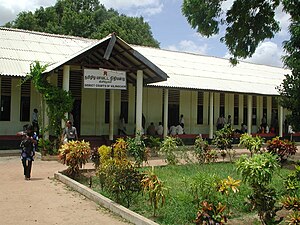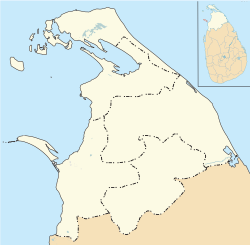Kilinochchi
Kilinochchi
கிளிநொச்சி කිලිනොච්චිය | |
|---|---|
Town | |
 Kilinochchi courthouse | |
| Coordinates: 9°23′0″N 80°24′31″E / 9.38333°N 80.40861°E | |
| Country | Sri Lanka |
| Province | Northern |
| District | Kilinochchi |
| DS Division | Karachchi |
| Time zone | UTC+5:30 (Sri Lanka Standard Time Zone) |
Kilinochchi (Tamil: கிளிநொச்சி, romanized: Kiḷinocci; Sinhala: කිලිනොච්චිය, romanized: Kilinŏcciya)[1] is the main town of Kilinochchi District, Northern Province of Sri Lanka. Kilinochchi is situated at the A9 road some 100 km (62 mi) south-east of Jaffna. It was the administrative center and de facto capital of the LTTE (Tamil Tigers)[2] until 2 January 2009, when troops of the Sri Lankan Army recaptured the city.
History
[edit]Creation (1936)
[edit]The Kilinochchi town was established in 1936 as part of a colonization project that sought to ease overpopulation and unemployment in Jaffna.[3]
Kilinochchi is still part of the Jaffna electoral division and it was separated from the Jaffna District in the 1980s as a new district. Most of the people living in this district are farmers and related to agricultural work. Most of the people migrated from Jaffna in the 1930s to acquire government grants for land in the region and to engage in paddy (rice) cultivation. During the 1970s, a large number of immigrants from the hill country, predominantly Indian Tamils, settled in the town. Much of the population immigrated overseas (Europe, US, Canada, Australia, etc.) during the Civil War (1990 onward). The population has begun to rise after the end of the war.[4]
Sri Lankan Civil War
[edit]
The LTTE first took hold of the town in 1990 when the Army withdrew its garrisons from Kilinochchi. Then the area was retaken by the Army during Operation Sathjaya in September 1996. The town again fell into the LTTE's hand in September 1998 who held their administrative hub there until retreating during the Battle of Kilinochchi on 2 January 2009.[5]
Several institutions of the LTTE were forced to relocate from Kilinochchi to Tharmapuram, a town about 13 km in the east, by early October, 2008 in fear of death by advancing government troops. Security Forces Headquarters – Kilinochchi was established on June 29, 2009, in the town.
Demography
[edit]Most people living in Kilinochchi are Sri Lankan Tamils and Indian Tamils.[4]
Economy
[edit]Kilinochchi is one of the major agrarian cultivation destinations in the island from the pre-historic times. Iranamadu Tank, Kanakampikai Kulam (Pond), and Kilinochchi Kulam are the major irrigation source for paddy and various other cultivations. However, the economy of the town has suffered in recent times due to the economic crisis, which has resulted in a lack of fertilizer and fuel, reducing crop yields.[6]
Transport
[edit]Kilinochchi is connected to the Sri Lanka Railways Northern Line via its railway station. The A-9 Highway passes through the town, giving it direct connection with the major cities of Jaffna and Kandy.
Media
[edit]Kilinochchi is served with all Jaffna- and Colombo-based newspapers. The Jaffna-based Uthayan has a regional office in Kilinochchi.
There have been discussions of not distributing Jaffna-based newspapers in the Vanni area, especially Uthayan. Uthayan is highly critical of inappropriate land acquisition in the Jaffna peninsula and the Vanni region by the Sri Lankan Military and Government.
Education
[edit]This district has one university faculty and several Government Colleges such as Faculty of Agriculture of University of Jaffna, Kilinochchi Central College, Hindu College, Uruthirapuram Maha Vidyalayam school, Vaddakkachchi Maha Vidyalayam school, institution etc.
References
[edit]- ^ "Kiḷi-nocci, Nocci-mōṭṭai, Nocciyā-gama, Nika-vala". TamilNet. June 13, 2007.
- ^ IRIN (25 March 2010) "Sri Lanka: Former rebel capital struggles with returnee influx" Archived 2024-01-02 at the Wayback Machine AlertNet, Reuters, accessed 25 March 2010, archived at original IRIN page
- ^ Manogaran, Chelvadurai (1987). Ethnic conflicts and reconciliation in Sri Lanka. University of Hawaii Press. p. 90. ISBN 0-8248-1116-X. Archived from the original on 2024-01-02. Retrieved 2020-11-14.
- ^ a b "Census of Population and Housing - 2012". www.statistics.gov.lk. Archived from the original on 2023-05-21. Retrieved 2023-05-21.
- ^ "Ruined remains of rebel 'capital'" Archived 2009-01-07 at the Wayback Machine, BBC, January 5, 2009
- ^ Ghoshal, Devjyot; Jayasinghe, Uditha; Ghoshal, Devjyot (2022-08-16). "Sri Lanka faces looming food crisis with stunted rice crop". Reuters. Archived from the original on 2023-05-21. Retrieved 2023-05-21.

